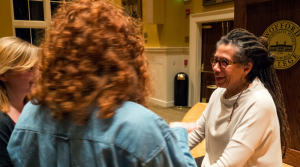By: Meghan Daniel, contributing writer

Nikky Finney says she became a poet on her grandfather’s farm where she “learned the power of meandering” and after pondering the truth behind Tolkien’s quote, “not all who wander are lost.”
Wandering around the farm in Newberry, S.C., at a young age is what Finney says “helped her get to her interior, which is the place where her work nests.” The time she spent on the farm observing people, animals and nature helped cultivate her lifelong hobby of journaling. Since the age of 10, she has kept a journal; at age 60, her collection of journals now numbers 172.
About her extensive journal collection and its millions of words, Finney says, “I am more terrified of not saying what I needed to say than I am of somebody reading my work.” Although her journals influence much of her work, she has not yet chosen to publish them. Pieces from select journals are, however, included in her upcoming work from which she read at Wofford on Feb. 28, 2018.
At the reading, Finney introduced her upcoming work as a collection of “occasional poetry,” a genre of poetry that is written for a special occasion. She says that, as a poet, she takes on commissions for occasional poetry only if she is able to create something out of her emotional response to the occasion.
In 2008, Finney was commissioned by Wofford College to write a poem commemorating the work of the slaves who built Old Main, the same building where Finney once again stood on this night to share her poetry with the campus and community. Before agreeing to write a poem for the commemoration in 2008, she requested memorabilia, documents and artifacts that would allow her to be immersed in the history of Old Main.
Only after plundering through the packages that were sent to her by Wofford was she able to confirm that she would be able to write the poem, which she entitled “The Thinking Man.” This intimate poetic process demonstrates Finney’s conviction that “writing poetry isn’t about telling her story but rather telling the story that we as human beings should share with each other.”
Finney elaborated on her poetic process both between her readings that evening and earlier that day in Dr. Patrick Whitfill’s Contemporary American Poetry class. One of the topics that she repeatedly returned to was her creative process. In a roundtable discussion with students in Whitfill’s class, she advised aspiring poets and writers to write every day and read voraciously. She says doing so provides access to the wealth of knowledge in the world, which enables the writing process.
In her words, “you don’t know what you’re going to need until you get there.” Finney says that there is information just sitting out there waiting to be used. She takes advantage of this easily accessible information by attending lectures in various academic areas; for example, she says she enjoys learning about the sciences because they expand her palette of ideas, allowing her to write in more than one dimension. Her multi-dimensional stylistic approach allows her to act as a puppeteer through her writing, leading her readers down the road she wishes for them to travel.
Finney compared writing and editing poetry to the art of whittling. She says that once she is sure she has all of the possible content on the page, she cuts away at the poem until “I begin to see what the poem is trying to say to me.” She explained that this process is “elbow grease, midnight oil…it’s work!”
Finney’s elbow grease and burning midnight oil are evident in her work. The poetry and journal entries she read on Wednesday evening at Wofford were brimming with empathy and vulnerability. Finney is not afraid to engage in topics that are uncomfortable. One of the pieces she read told the story of four African/African American women, each of whom was a victim of hateful and absurd forms of discrimination. The poem, however, is not meant to evoke pity. Instead, Finney insists on the power and endurance demonstrated by African and African American women who have undergone such discrimination and yet who remain pillars of strength.
Finney says she writes poetry about strength and perseverance because she has a feeling of responsibility to remain true to “who she says she was,” her identity, her beliefs, her perceptions. She says simply that she is a poet because “this is what I came to earth to do.” The epigraph for her 2011 collection “Head Off & Split” is a quote from a postcard written to Finney from writer Toni Cade Bambara. It reads, “Do not leave the arena to the fools.” Finney says this quote encourages her to continue seeking and speaking truth through poetry. She says, “I have been on a search my entire life for the way, the path, the journey to have and to keep a beautiful mind.” This journey is what fuels Finney’s writings; it is why she says, “I believe in poetry.”



























